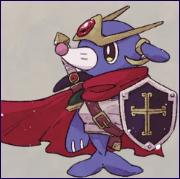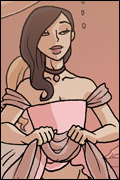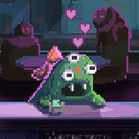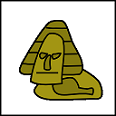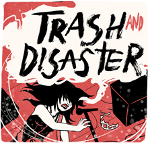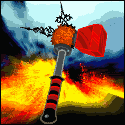|
Gutter Owl posted:Getting a bit tricky to track all this mentally. Any chance you'll have a rules doc or a shareable prototype soon? Ah yeah, I guess it all makes sense in my head but might be pretty hard for everyone else to follow e: Anyone have a recommendation for easy-to-use programs for mocking up player cards and tokens and such? I have photoshop but it seems like a bit overkill, and mspaint seems a bit underkill. CodfishCartographer fucked around with this message at 22:26 on Mar 2, 2014 |
|
|
|

|
| # ? May 13, 2024 22:14 |
|
Sharpness feels... I dunno, unnecessary? I know it's a mechanic in MH, but is it currently adding a lot? Especially the "sometimes you deal extra damage" thing. Does the game not have enough decisions to make without it? Do the players like having to sharpen weapons? You might want to consider a "discard one, use one" system for the cards, like Kemet uses for combat. That way you'll cycle through your hand faster, and have fewer options available more often (which both speeds up the game and gives that feeling of dread and fear all good co-ops need).
|
|
|
|
The primary thinking behind sharpness is that it puts a little more emphasis on positioning around the monster, as it makes attacking certain body parts more desirable. For example, breaking the claws won't lower the sharpness required much, but greatly reduces the damage they deal - so if you're having trouble surviving, maybe players will want to take those out quickly. Breaking the head won't reduce the damage it deals by a lot, but will lower the required sharpness to a level where most players will be able to easily get double damage out of attacking it. So then should everyone just group up and try to burst the monster down by wailing on its head, thus risking a team wipe if the monster decides to hurl three fireballs in a row while enraged? etc. I thought it was interesting while I played through it solo, dunno how it'll go over with other players, though. I really like the discard one, use one idea. AS it is, players didn't go through their hands quite as quickly as I'd like, and that sounds like the perfect solution.
|
|
|
|
I've been playing with a mechanic in a few design documents which I'm not sure is either novel, nor necessarily fun. The basic idea is that it would be a deck builder where your deck is made up of primary colored cards - red, green and blue. You have three books that you can be building at any one time, which is comprised of three different cards. Each turn you pick up a card, then you must play a card each turn, and when your deck runs out you reshuffle. When a book reaches its three card limit it is activated, and its effect is determined by what colors comprise it. In the case of a really simple RPG battle system, like 3 reds would be a basic melee attack. 3 blues would be a basic long-range spell. 3 greens would be a low-damage attack that bypasses defenses. Some of the potential problems I can see is that outside of really simple combinations (like all 3 of one color) it would be cumbersome to keep track of a gazette or reference sheet telling you what different combos do. Also typical stuff that makes deck-building drag on, like reshuffling and turn maintenance. Another possibility that I was considering would be to have a similar system, but with dominoes, where each total tally represents a different effect. This could reduce some of the unfun aspects of constant shuffling, but it would be harder to conceptualize the probabilities in your bag, and unless you were really good at memorization would approach random luck. Do any games already have something similar to this, and if so then is it enjoyable? If not, then does that sound like a mechanic that would be fun to engage with?
|
|
|
|
One possible way to handle it would be to have it so that each card gives a simple, numerical benefit of some kind to the book attack, once completed. These are added on to a Base attack, done by the book, for the final. For example, your three spellbooks might be "Bolt" (0 Damage, 0 Speed, 2 Pierce), "Ball" (2 Damage, 0 Speed, 0 Pierce), and "Storm" (0 Damage, 2 Speed, 0 Pierce). Red cards would add 1 Damage, Blue would add 1 Speed (or Range?), Green would add 1 Pierce. The biggest issue I can see with this is that ATM, there's not really any incentive to put your cards in a specific book. You might have luck if you add some kind of stacking bonus. Like, the effect is increased by +1 if you have 2 cards of the same colors, and every stat gets +1 if you have 3 cards of the same color. ...something about this feels like it'd work very well in real-time.
|
|
|
|
The Leper Colon V posted:One possible way to handle it would be to have it so that each card gives a simple, numerical benefit of some kind to the book attack, once completed. These are added on to a Base attack, done by the book, for the final. For example, your three spellbooks might be "Bolt" (0 Damage, 0 Speed, 2 Pierce), "Ball" (2 Damage, 0 Speed, 0 Pierce), and "Storm" (0 Damage, 2 Speed, 0 Pierce). Red cards would add 1 Damage, Blue would add 1 Speed (or Range?), Green would add 1 Pierce. The biggest issue I can see with this is that ATM, there's not really any incentive to put your cards in a specific book. You might have luck if you add some kind of stacking bonus. Like, the effect is increased by +1 if you have 2 cards of the same colors, and every stat gets +1 if you have 3 cards of the same color. That's not a bad idea. Have a single unified rock/paper/scissors sort of system of interaction, and then have each card be a modifier... So, for example fighting a monster, you could have three different resist categories (Damage / Speed / Pierce) and players have to make choices to either pass the monster to someone else or build books which the monster is weak against. The deck building aspect that I've been toying with (which builds on the base system of books) would be that after each 'level' (for lack of a better term) you would get the option to switch out three of your cards for different colors. Players all start with the same deck, and then diversify over time. Another aspect of this, which I applied to a monopoly style game, was that the cards can be used for money, movement, or for executing powerful special moves as mentioned above. The powerful special moves take the cards out of circulation until you can complete them, but give you an advantage further down the line. Then it becomes a balance between moving to spots you want to move to, buying properties you want to buy, or setting up a monster turn with a special move...
|
|
|
|
A real time game absolutely sounds neat, and Jab needs more competition for real time battling game king. That said, if the design goal is "a JRPG battle system board game" then real time probably isn't in the cards (ha). I think the three color system is too simple, and not just because I like meatier games; There's only so much you can do with a 3-color hand that doesn't lend itself to quickly mathing out the Best Play. The exception to this is when you have a bunch of additional mechanics like "I played 3-red last turn, that means my hand is now capped at 1-red BUT I get an inherent +2 Damage this turn," and when you get to that point it feels like you're losing the simplicity that you were presumably shooting for with the customizable and intuitive color mix. Basically, it sounds cute, but it doesn't sound like it has a lot of meaningful decisions to make without adding in a lot of layers.
|
|
|
|
Which is why I recommended real-time. If working on Dig Too Deep has taught me anything, it's that there's no cure for over-simplicity like a time limit.
|
|
|
|
Countblanc posted:A real time game absolutely sounds neat, and Jab needs more competition for real time battling game king. That said, if the design goal is "a JRPG battle system board game" then real time probably isn't in the cards (ha). Yeah, that's been my experience in actually designing games. Either it's too luck based, too simple and boring, or I start throwing tons of poo poo in there which increases complexity but makes you have to have a book on hand to realize all of your moves. I think I'm going to try to think of an entirely new way to apply it, since I've mostly been making analog JPRG type stuff with it...
|
|
|
|
I'm finally getting a chance to mockup the cards for a card and board game I've been working on for a while. The basic concept is that you're an interstellar bounty/treasure hunter with a crew, a ship, and an empty wallet. The core mechanics are still being tweaked, but basically, a bounty card is revealed (either every turn or at a specific trigger) and the players get a chance to go after it, competing or co-operating with to capture it/them. Characters on your crew can have bounties put out on them under certain circumstances and almost all of them have their own static or activated abilities. I've got a hex board representing 30 random sectors of space (with a d30 for randomization) with 6 static locations and a center point that will likely have some other mechanical significance (wormhole, black hole, jail?). I was partially inspired by Arkham Horror, but I feel like that game is very over-designed and I want to streamline as many of my mechanics as possible. I also want to make the card pool (characters, equipment, ships, etc) similar to an LCG, with a game framework that can be added to over time with expansions. Currently the win-con is getting X bounties, but I'd like to come up with something either a bit more flavorful or flexible, as I've got a few variants of the game in mind that use the same core mechanics but different goals (alien invasion, time travel shenanigans, etc). I guess I could make it something like 10 points like Catan or Munchkin, but that feels very arbitrary. If I go with that, I'll certainly have a couple other potential win-conditions.
|
|
|
|
Space Bounty Hunters sounds like a For victory conditions you could always let people choose from a variety of bounty-hunter-ish things that area affected by which bounties you go after, what you choose to do and how you do it. Perhaps everything can affect your notoriety, fame, and cash. Magic Realm had the idea of notoriety and fame being able to both go positive or negative. Notoriety represented whether and how much you were feared (positive number) or reviled (negative number). Fame was how much you were celebrated (positive), or scorned (negative). Notoriety and Fame, along with money, were all just different currencies. Different objects and actions and enemies all either had a + or - for one or more of those attributes attached to them. Adds some extra numbers but allows very bounty-hunter-ish grey area reputation combinations, which in turn could be winning conditions (e.g. wealthiest, most feared, etc etc)
|
|
|
|
MY knee-jerk thought when reading over the idea is that there'd be one overall victory point (same tokens?), but you can attain it in a ton of different ways. Capturing bounties would earn it, but so would raiding passing ships, and completing lots of (re)quests, or finding rare treasures, or you could just straight-up buy it. So each player could have their own strategy for achieving fame, and all the others are trying to gently caress with that person's strategy while promoting their own. The main problem I could see with that would be if two out of the five people playing both go for the same 'goal' then they're shooting each other in the foot - but that may be able to be solved via clever design.
|
|
|
|
You could always make the win condition something along the lines of "5 of one type of point, 3 each of two types, or 2 each of all four types."
|
|
|
|
CodfishCartographer posted:MY knee-jerk thought when reading over the idea is that there'd be one overall victory point (same tokens?), but you can attain it in a ton of different ways. Capturing bounties would earn it, but so would raiding passing ships, and completing lots of (re)quests, or finding rare treasures, or you could just straight-up buy it. I like this idea particularly because it distills right down to a black and white "# of win points" while leaving the complexity to the decision-making of how to get them & keep others from getting them. In other words it's easy to see who is winning more than who at a glance so you can make strategic decisions, instead of "who is winning more than who" being all thinky (aka comparing more than one thing).
|
|
|
|
About a year ago I posted an idea I had for a then-unnamed 2v2 euro-style game about superheroes fighting supervillains. I shelved the idea for, well, basically a year, but over the last week I had an explosion of creativity and motivation, so I opened up my old Google Drive document and started writing whatever ideas popped into my head. I'm writing this post half to get advice and half to get my ideas in a more coherent, focused format instead of a ton of bullet points and underlined words. Anyway, I present to you, Capes: Weekend Warriors. Capes is a game about amateur heroes and villains who, between studying for college exams, working at their day job, or frequenting the gym, fight crime/crimefighters. The game is broken down into two phases, Weekdays and Weekends; During the week you'll be doing the daily grind while trying your best to increase your crime fighting/committing abilities, and on the weekend you'll square off against the other team in combat (hence the name). The main objective is, in typical euro-fashion, to accumulate points [note: I'd like a cuter name for points that could ideally be acronym'ed into VP, but obviously this is low priority right now]. Points are gained through combat, which currently happens either two or three times over the course of the game. Some basic terms: Cells - These are the game's primary currency. Cells are used to gain new powers and to pay for existing ones in combat. They currently come in 6 different colors and represent pretty basic stuff: White is vitality/inner strength, Black is sorcery, Red is physical strength, Yellow is speed/dexterity, Blue is intelligence, and Green is luck/bravado. I might trim this list to 5 or even 4, but currently 6 sounds good. There's a 7th type, Wild Cells, that are basically rainbow energies that also increase the damage of any power they're used in by one (this second part may change). Only one Wild Cell may be used per Power. Justice Bucks - The game's secondary currency, and the canonical currency of the game's metropolis. Primarily used to buy gadgets. I want to use this for something else, like a "feed your family" mechanic from Agricola/Stone Age to make it more appealing, but I don't have any immediate ideas. Nothing crippling though, ideally. Powers - Things used in combat. "Powers" specifically refers to activated effects, no powers are passive. Always have a base effect, Cells empower them in different ways. Your character starts with some of these, but most are generally gained during the week phase. There's a special type of power, "Team Up!"s, which use both teammate's turns in combat and tend to require more Cells for their effects. Gadgets - Primarily passive effects, bought with money during the week phase. At the start of the game, players choose a hero or villain (I'm just gonna say "heroes" from now on), each with a suite of unique abilities and stats. Currently heroes have Cell aptitudes which determine how good your character is at gaining each color of Cell, two (maybe 3) Powers, and a passive effect (possibly two, one for the week and one for the weekend. maybe not? who knows). Your character board also has a currently-unknown amount of numbered slots; When you obtain a power (gadgets might also occupy slots, currently they don't) it goes into one of these slots. You can swap your Powers out at any time during the week, but as soon as the weekend phase begins, they're locked. You also have a hand of numbered cards equal to your number of equipped powers, and you gain/lose cards as you equip or lose powers (you start with 2/3 since your character automatically has some powers, as well as a Team Up! card). Team Up! powers do not occupy a slot, but you may only have one between the two of you. After choosing heroes and teams, play begins in the first week phase. This is pretty typical worker-placement stuff, with each player getting a few workers that you place in various spots to do whatever the action is and block others from doing the same. Every spot has two openings, and everyone has three "workers". Board spaces that currently exist are: Gym - You go here to gain Red and Yellow cells. Library - You go here to gain Blue and Black cells. [unnamed] - You go here to gain White and Green cells. Office - You go here to gain Bucks. Research Facility - You can exchange Cells for Bucks here, faster than the Office but obviously a steeper cost. Lab - Where you buy Powers. Powers are a deck of cards where some number of them are revealed and whenever one is removed a new one takes it place. The card at the end of the queue is destroyed at the end of each weekday if no Powers have been bought. [Unnamed] - Purchase gadgets here. Works in the same way as the Lab. The Cell-gathering spots work like Stone Age (roll a die, gain the number of cells shown), but instead of piling workers on to roll more dice your character's Cell aptitude modifies it; A character's aptitude can either be Poor (1), Average (2), or Superior (3). A character with Poor aptitude will gain an extra Cell if they roll a 1, a character with Average will gain an extra Cell if they roll a 1-2, and a character with Superior with always gain an extra Cell. [NOTE: All dice are 6-sided and numbered 1-3, with each number represented twice. This may change to three 1's, two 2's, and one 3 if it seems weird). The Office is similar, but since characters don't have aptitudes for Bucks, you instead roll two dice and take the sum. I currently HATE this idea since gaining between 2-6 money is a huge swing, so any suggestions are appreciated. Maybe just make a Bucks aptitude and deal with it. The Research Facility is much the same, except you get one die and can pay cells to increase it by one per cell spent. I already explained the Power and Gadget spots, but feel free to ask for clarification as this is all very stream of consciousness since I get distracted waaaaay too easily. After each day is done (either when everyone passes in a row or runs out of workers, passing does NOT remove you from the round unless everyone does it in order), you collect your workers and rise/repeat for a total of 5 weekdays. Once it hits the weekend, combat begins. Before combat starts, you get one final chance to equip and arrange your Powers, and then you pick up your hand of numbered cards. Everyone chooses a card from their hand that corresponds to the power they want to use, places it face down, and reveals simultaneously once everyone has chosen. The character with highest Initiative then chooses which Cells they want to spend on their power, completes the effect, and passes to the next highest initiative. Once everyone has acted, the numbered card goes to that player's discard pile, and new cards are chosen. If your hand is ever reduced to two or less cards at the end of a round, you may shuffle up your discard pile and draw it again before choosing a card to play. To activate a Team Up! power, both players must play their Team Up! card. After a certain number of turns of combat (undecided), the fighting is over and points are tallied. Characters have health benchmarks, and if they're at or below that number the other team gets a point. All characters currently have the same amount of health and benchmarks, but this may change: 25 health, benchmarks are 22, 18, 13, 7, and 0, with 0 being worth an extra point. I may change how many points each benchmark is worth, but the idea is that I want players to have an incentive to do something other than just focus target one person, so the benchmarks are spread out a bit. This also gives me some design space with Powers. A character can never "die", being at 0 merely is simply a point benchmark (this may change). Combat statuses Dazed: Any damage the player deals while dazed will never trigger a point benchmark. For example, if the attack would deal 5 damage while the target is at 20 health, it would only deal 1 point of damage, stopping at 19. Dazed lasts until the player performs an attack. Does not apply to Team Up attacks. Afflicted: An afflicted player takes 1 damage at the start of their turn. Lasts until the end of combat. Bolstered: A bolstered player may treat any one cell as a Wild Cell on their next attack. Demoralized: A demoralized player cannot spend Wild Cells on their next attack. Once points are tallied, the next week begins. I haven't completely decided how the second week will be different, I'm considering different powers/gadget decks with more powerful effects that may be able to be upgraded 7 Wonders style (Having "Eldrich Blast" may reduce the cost of "Eldrich Eruption" by some amount). Maybe not? It seems like a fun thing for the player but obviously more difficult to create, and if the decks are too large it also means one player might just lucksack into getting cheap, strong powers while the others have to expend hella resources. And that's the game! Here's a few sample Powers, the numbers are in no way representative of what they'll be later but hopefully this gives you some idea of what I'm talking about. None of these have costs because, quite frankly, I don't really know where to begin with that so I'll just slap some arbitrary numbers on there later and see what happens. Also, if a card ever says something like "2 black, 2 white" it means BOTH 2 black and 2 white. If it says "2 black or 2 white", it means one or the other. quote:“Eldritch Surge” Thanks for reading all this garbage! I leave you with a few pointed questions about what to do with the game, but feel free to comment on anything. Because I don't want to get into my usual navel gazing, I'm going to try to whip together a prototype of sorts and bring it to my board game club tomorrow evening to get a play in, but any advice prior to then is welcomed! Things I need help with in general: - Ideas for how to handle Initiative. Should characters have innate Initiative (perhaps modified by a die roll)? Should Initiative be on Powers? What happens in the event of a tie (note: I can easily make ties a non-issue by simply not making powers/characters with conflicting Initiatives if I use a large enough scale, like 1-50). If characters have initiative, what determines when Team Up! powers trigger during a turn? - How different to make the characters. - Options for making money more appealing. - Should there be a board location for gathering Wild Cells (probably at a reduced rate)? - More power/gadget/character ideas. Holy crap, This. Things I need help with but will probably only learn through testing: - How many times weeks/combats there are in the game. - What are interesting/fun "stats" for the characters to have, and if aptitudes are too strong/weak. This is probably something I can math out but yeah. - How long combat should be. - If it's better to have a player choose how many Cells they spend on a power when it's their turn in the initiative order, or to do a closed fist auction-style thing where everyone chooses which Cells to use simultaneously after seeing which powers everyone picked. EDIT: I've made a few keywords to make Powers a bit more concise, and to provide some design direction (mostly for myself, ha). They are: Heal X - Heal that amount. Damage X - Instantly deal that much damage. If attacks have multiple "Damage" effects, they count as separate attacks. This is relevant for... Prevent X - Prevent that amount of damage from the next damage source. Lasts until you take damage, currently doesn't stack. Empower X - The next source of damage the target deals is increased by X. This is basically a way to buff yourself or others, but it also interacts with Prevent in obvious ways. If an attack both Damages and Empowers the attack itself is Empowered. That's all! I fixed the language in the sample Powers to match this. Countblanc fucked around with this message at 08:32 on Mar 7, 2014 |
|
|
|
Off the top of my head: -Maybe make the duration a month? (a.k.a, 4 weeks of play? Seems like an easy figure to use that would fit into the theme) -Valor Points sounds good for score in a superhero game. -For the white/green cell building maybe 'Herbalist', 'Apothecary' or 'Alchemist'? Maybe Church or Fortune Teller? There's a couple that work here IMO. -Gadget producer could be "Enthusiast" a.k.a An Enormous Nerd/Not actually a superhero. I'm thinking something along the lines of Gimpy from Undergrads but more cyberpunk-y?? I like the idea of the heroes having an innate Initiative stat, as it be used as both a character trait and as a balancing tool (i.e Defence from Gauntlet of Fools, albeit that is a much simpler game than this). But in that case Ties get harder to deal with; maybe if there's a tie, the Hero with the most Agility cells goes first? If they tie in that case as well, then you use.. uhh...err.... I'm not sure if you want cells having any effect on the game outside of powers/combat. I'm not sure how well doing initiative the other way and making it part of each of the power cards would work. It'd also probably be a PITA to balance. In terms of Initiative, if you and your partner are performing a Team-Up!, it should come down to the slower initiative between the two players/powers as to when it activates. A chain is only as strong as the weakest link etc. I like the idea of Gadgets not being included part of your powers, much like the Tools in Stone age, but obviously with a limit of X (1-2?). This could lead into a hero that has more gadget slots (3-4) than power slots (1-2) depending on the relative strength of the gadgets/how they actually end up working. As for abilities getting stronger over the course of the game/upgrading into stronger powers; I like how 7 Wonders handles that, but I had a different idea for your game. What if the powers stay the same throughout the entire game, but the production of cells becomes easier or rewards in more cells (a.k.a make it easier to activate the stronger abilities of Powers as the game goes progresses)? I think this fits in well, but would probably require you to re-think about the costs associated with Powers and how Cells are produced. This gets around the lucksacking and keeps the decksize down, and also allows you to plan your weeks and choose to go for consistent damage over several combats, or building into a game-changing Power in a later week. For example this would condense your example Eldritch Powers into a single "Eldritch" Power card that features, Eldritch Bolt, Eldritch Blast, and Eldritch Eruption with associated scaling cell costs. If you go with the above for Powers, you'll probably have to restrict Power slots to 2-3, as having upwards of 12+ different abilities seems fairly ridiculous (unless they're made to be the same ability just with bigger numbers). That's all I have for general mechanics, I'll try and come up with more character/power stuff. I can't help you w/r/t/ money 
tony police fucked around with this message at 21:48 on Mar 7, 2014 |
|
|
|
quote:For example this would condense your example Eldritch Powers into a single "Eldritch" Power card that features, Eldritch Bolt, Eldritch Blast, and Eldritch Eruption with associated scaling cell costs. I feel like you want to push more power rotation somehow. Swapping out powers feels like it'll be a fun part of the game, and the days could get pretty repetitive if people like their first skills and keep farming the same cells or whatever. I'm thinking maybe you have a number of power slots of different levels. You can get new slots, or "level up" old slots, meaning they can old higher level powers. It'd be good to have some high level powers, but you'd also want a variety so you can effectively use all your cells, and can respond better to what the other team does. In general, it seems like it might also help to have some "build-up" spots (as alternatives to the aptitude based roll spots) where you, say, add a green each round until the pile is taken. Or possibly, you distribute cells from a pool to random spot, like the shipping in Castles of Burgundy. This creates sort of a natural auction mechanic, and might push people to do more adapting over time to take advantage of big (but random) piles. As to initiative, I don't terribly like bouncing turn order. I also think you need more spaces. I'd just have play proceed clockwise, with separate starting players for the worker placement and fight phases - and new spots where you can take the "first player" marker for either part. (I don't have a very full grasp of your current rules in my head, so excuse me if I'm misreading some of your intentions/ideas). Also, this game is a very natural home for variable player powers. They're work to balance, but thematically there's so much potential. I'm Batman-y, so I gain money quick. Mutant guy starts with a higher power slot unlocked. Magic guy can swap power cells 2 for 1 at any time. I think that sounds fun, anyway. jmzero fucked around with this message at 22:38 on Mar 7, 2014 |
|
|
|
jmzero posted:I feel like you want to push more power rotation somehow. Swapping out powers feels like it'll be a fun part of the game, and the days could get pretty repetitive if people like their first skills and keep farming the same cells or whatever. Yeah, I hadn't completely thought that out in terms of how it'd play out late-game. "jmzero posted:
I like this, but it's difficult to distribute the higher powers evenly if they're all bought from the same board space (Lab). It could lead into situations where a player might not be able to claim a Lv. 2+ power unless they're able to place the first worker on the Lab (i.e a player might get repeatedly screwed out of stronger Powers when they're the first player and no Lv. 2+ powers come up on the Lab that turn). I was thinking something like giving the Lab a fixed distribution of Powers? If the game goes for 4 weeks it could break down something like (lets say 3 powers are revealed on the Lab each turn) 1st week: Lv.1/2 (two Lv. 1 Powers, one Lv. 2) 2nd week: Lv.1/2/3(one of each) 3rd week: Lv.2/3/4 4th week: Lv.3/4 (two Lv. 3s, one Lv. 4) The only issue I see with this, is that it 'forces' players to upgrade their powerslots, but I don't see that as such a terrible thing depending on how it's handled. It also fucks with the plan of the 'queue' idea and how the Powers are replaced, but that can be changed fairly easily. I'm not sure if this added complexity is needed, but you could use the Justice Bucks as the currency you need to 'upgrade' your power slots. tony police fucked around with this message at 23:17 on Mar 7, 2014 |
|
|
|
quote:but you could use the Justice Bucks as the currency you need to 'upgrade' your power slots Yep. I also like the idea of more than one lab slot - like maybe one slot that's "trade a power and take a buck", and another that's like "discard the powers on offer and refill them, then take a power".
|
|
|
|
You could just have one deck of power cards per week, like how Galaxy trucker has a different mini-deck of cards for each round. Most Week 2 cards would generally be more powerful/useful than most Week 1 cards (and may have a higher cost to buy / use?), most Week 3s would be better than most Week 2s, etc. Then you could maybe have a "Radiation Dump" area or something where players can get a random card from a previous week at a reduced cost. It would encourage players to keep swapping out powers as the game goes on, and would help players feel as though they're getting stronger. As for the initiative problem, I would expect each power to have its own initiative - it could be easier to balance their strengths that way. It also makes sense since Charging up a Super Hyper Mega Dragon-Fire Punch would take more time than a shin kick. Also, I could see Valor Power and Villainy Power being the VPs. CodfishCartographer fucked around with this message at 00:33 on Mar 8, 2014 |
|
|
|
I just got back from my first incredibly slipshod playtest, hooray. Learned an absolute ton, and have discovered some of biggest problems (so far) with the game. The things that really jumped out are: 1) Character Powers being as good as purchased Powers means that there's [perhaps many] situations where you'll just elect to not bring all or even any of your purchased Powers into combat, so you can recycle your hand faster. This also meant there was little reason to buy powers that weren't absolutely amazing for you. - Current Solution: Have everyone start with two character powers, as they currently do, as well as 3 generic "Punch"-type powers that aren't as useful as the stuff you'd buy, and that you have to bring a full power loadout. That way you'd never have fewer than 5 Powers. 2) Money is kinda weird? Everyone liked that there was a secondary resource but wasn't really sure what to do with the extra, and there definitely was some. - Current Solution: Everyone must pay Rent at their lovely motel every weekday. If you don't make rent, your first worker placement of the following day doesn't do anything (so you can use it to block stuff, but not gain anything). We actually used this in our playtest game and it went very well, it's just that the numbers aren't where they need to be and Gadgets aren't properly priced yet. 3) It's too easy to do everything you want, to the point where Day 5 was basically gathering Cells just to kill actions. - Current Solution: Everyone has two workers during the first week instead of three. This makes the first week feel a lot more panicked and players aren't able to just dump their best powers and strongest effects over and over in combat. This was also sort of spurred by the current rate you get resources, which has slightly been slightly neutered. Considering locking out certain spaces (or vacancies in spaces) during week 1. 4) Healing feels boring. I didn't really post many (any?) healing powers, but basically I introduced healing because it interacts with health benchmarks in fun ways. It still does, but it was too common and too weak, so it didn't really feel like an interesting choice. I think just having more content will fix this since the percentage of cards that heal/prevent damage is waaaay too high since that's all I could brainstorm. - Current Solution: Probably just making heal effects more rare and more powerful. 5) Not enough content. Self-explanatory. DEFINITELY not enough controlled ways to generate Wild Cells, but I don't want too many? I don't know. Thank you everyone for your suggestions - There's a lot of stuff in there I really like, such as evolving powers (this also helps with encouraging players to buy stuff. I think I'm going to ditch Afflict for the time being because it's crazy messy, but things are definitely starting to make a lot more sense. We went with card-based initiative in combat and it was fine, but I think next time I'm going to test having every character (I only had two, so each team had one of each) have an initiative with powers offering modifiers, and tiebreakers being broken by whoever played the larger modifier. jmzero's idea to have "build-up" spaces is wonderful, I feel like a dope for not thinking about it. I might have to increase workers back to three since it'd obviously mean more spots, and increase some power costs, but that's not really a bad idea? I'll definitely test it to see how players like it. I'm not sure how much I want to mess with the number of weeks right now though. Any more than two is, at the current game's pace, going to take a long time with that many more turns and I really want something that plays within a tidy 45-60 minutes. I also COMPLETELY FORGOT to make any Team-Up powers, so those obviously didn't get testing. Still, a very productive evening, and thanks again for all the feedback! e: Here's a PasteBin with all the current powers/characters/gadgets. Hopefully this makes some things a bit more clear. Countblanc fucked around with this message at 06:15 on Mar 8, 2014 |
|
|
|
So I'm working on a print-n-play mock up of the Monster Hunter Board Game right now, despite the fact that my gaming group has been too busy to help me get a playtest in. Anyways, I was curious: how does everyone like to handle scaling difficulty? Right now I'm facing a bit of a problem where I want the game to always be pretty challenging, but it's turning out to be pretty hard to balance that when you can have 1-4 hunters wailing on the monster. If I make it challenge for a group of four to down a dragon, then it'll be drat near impossible for a solo hunter. If it's challenging for 1-2 hunters, then it'll be a walk in the park for a group of four. The easiest answer to this is to just give the monster more/less health depending on the number of players, but I'd like a bit more elegant of a solution than this. Anyone have suggestions?
|
|
|
|
Consider a shared health pool for the players, or having one die means a failed hunt. The latter probably makes more sense thematically, but you could really just handwave the former to mean whatever you want since health can as easily be an abstraction of "desire/ability to keep fighting" as much as it can mean "literal life force." This obviously doesn't fix every difficulty problem, but I think that coupled with some increase in monster health would do the trick.
|
|
|
|
CodfishCartographer posted:So I'm working on a print-n-play mock up of the Monster Hunter Board Game right now, despite the fact that my gaming group has been too busy to help me get a playtest in. Anyways, I was curious: how does everyone like to handle scaling difficulty? Right now I'm facing a bit of a problem where I want the game to always be pretty challenging, but it's turning out to be pretty hard to balance that when you can have 1-4 hunters wailing on the monster. If I make it challenge for a group of four to down a dragon, then it'll be drat near impossible for a solo hunter. If it's challenging for 1-2 hunters, then it'll be a walk in the park for a group of four. The easiest answer to this is to just give the monster more/less health depending on the number of players, but I'd like a bit more elegant of a solution than this. Anyone have suggestions? Scaling health is just going to make the game longer--already a problem with increased player counts, so you're going to get an exponential playtime problem. Likewise, you need to account for the fact that the hero team is not only getting more combined health, but more combined actions each turn, so the monster will get still get easier with more players. Instead, I'd vary the amount of damage/drawbacks the monster is dealing each turn, either by making the damage on cards a variable (e.g. Claw does 2X damage, where X is the number of heroes), or the initiative value of the monster cards a variable (i.e. -1 initiative cost per player after the first). A possibly more elegant solution would be to let the monster charge multiple cards simultaneously, with multiple initiative markers. So on normal difficulty, a monster fighting two heroes is charging two attack cards at a time, whereas a monster fighting four heroes is charging four attacks at a time. Countblanc posted:...or having one die means a failed hunt. Also, seconding this.
|
|
|
|
I'm really liking the "one death means a failed hunt" idea. Originally I had it so the monster had 2 KO tokens it could pass out - each time a player ran out of health, they'd be knocked out and take one. Having one would reduce the player's maximum health, and if a player died when the monster didn't have any left then they'd be killed instead of knocked out, causing the players to lose the game. Maybe I could alter the number of those tokens the monster gets based off of the number of players - 3 tokens for solo, 0 tokens for a 4 player game. Not sure if that'd be enough to make it appropriately challenging, but it would definitely add to tension when someone is at low health and everyone at the table is panicking trying to figure out how to delay the monster enough for that person to have enough time to down a potion. Having multiple initiative markers for the monster based on the number of players also sounds super interesting, but it may get a bit confusing upkeep-wise.
|
|
|
|
A good explanation for the "One Death" rule could be that your hunters have a 'no one left behind' mentality, so if someone goes down they all retreat to regroup. One way you could balance for multiple players would be to adjust how often the monster gains a Rage token. This could be something like adding more tokens to the health track, or you could even make it so that whenever a monster takes damage from 3+ attacks in the same turn, they automatically gain a Rage token. Either way the players can still plan around it, but it introduces some complications. You could also tie it into the Item system. Maybe each hunt is only authorized X amount of each item no matter how many hunters there are? So as the amount of hunters goes up it becomes more challenging to manage your limited item pool. EDIT: If you end up making up the stuff for a Print and Play to test it would you mind sharing the document with me? I have a friend visiting this week who actually got me into Monster Hunter and I'd love to test it out with them and give you some feedback. Misandu fucked around with this message at 22:46 on Mar 8, 2014 |
|
|
|
Misandu posted:EDIT: If you end up making up the stuff for a Print and Play to test it would you mind sharing the document with me? I have a friend visiting this week who actually got me into Monster Hunter and I'd love to test it out with them and give you some feedback. Absolutely! My plan was once I get it finished, I'll upload it here for everyone to deconstruct. I should hopefully have a mockup of a rulebook done tonight or tomorrow sometime, so people can go through it and comment on any inconsistencies or confusing parts.
|
|
|
|
I've got a card game I'm working on that I playtested a bit today. I'd like to also playtest with people online but I'm not sure what the best way to accomplish this is. Roll20 has card decks but as far as I can tell adding duplicates of a card requires uploading the same image over and over for copies. Is there a way to duplicate cards easily? If not does anyone know of an alternative tool that handles cards better? I might just power through getting the decks together for this thing but I see this becoming amazingly tedious and time consuming when I start to make changes to the design.
|
|
|
|
Can anyone tell me what the proper term for dice that are tiered, and the tiers' values are weighted in such a way that, for example: Tier 1 dice usually (but not guaranteed) are beaten by tier 2 and 3 Tier 2 dice usually beat tier 1 dice, but can in uncommon cases beat tier 3 Tier 3 dice usually (but not guaranteed) to beat tier 1 dice, and to a slightly lesser extent tier 2 dice. There is still a chance to roll lower than either tier 1 or 2, though. and so on Basically a die on tier N is most likely to roll higher than any die in a tier below it (<N), and most likely to roll lower than any die in a tier above it (>N). The degree of difference in values being proportional to the difference in tier levels. I know there's a term for this but I have no idea what it is. The Eyes Have It fucked around with this message at 10:01 on Mar 10, 2014 |
|
|
|
Heavy Zed posted:I've got a card game I'm working on that I playtested a bit today. I'd like to also playtest with people online but I'm not sure what the best way to accomplish this is. Roll20 has card decks but as far as I can tell adding duplicates of a card requires uploading the same image over and over for copies. Is there a way to duplicate cards easily? If not does anyone know of an alternative tool that handles cards better? Mister Sinewave posted:I know there's a term for this but I have no idea what it is.  v v
|
|
|
|
Mister Sinewave posted:Basically a die on tier N is most likely to roll higher than any die in a tier below it (<N), and most likely to roll lower than any die in a tier above it (>N). The degree of difference in values being proportional to the difference in tier levels. I don't know if there's a term for it but it's also no more complicated than just using dice of ascending size. A d6 usually (58% of the time) beats a d4 and a d8 usually (56% of the time) beats a d6. If you want those to skew more towards the bigger dice maybe go up two steps at a time, like d4, d8, d12 maybe. Edit again: Maybe call them transitive dice in contrast to non-transitive dice? Heavy Zed fucked around with this message at 10:25 on Mar 10, 2014 |
|
|
|
Transitive dice is like that, except the top "tier" is also beaten by the bottom "tier", such that there is no "best" choice unless you know what your opponent picked.
|
|
|
|
No I get that. The ones I linked to are non-transitive dice. Mister Sinewave wants dice that just neatly go in ascending order, so they would be transitive.
|
|
|
|
I think I caught your post pre-edit. But yeah, ignore me, I had the names the wrong way around anyway.
|
|
|
|
That link and article gave me exactly the kind of details I wanted to know, thanks!
|
|
|
|
So I was rewatching the SU&SD review for Mage Knight, and they pointed out how the player board is like a cockpit of your own personal fighter jet. It got me thinking, that could make for a cool space game. One where your player card acts as your cockpit and starts out really simple, but you add onto it making it more and more complex in various ways as you upgrade your ship. Maybe something like a more simple but personal Space Cadets. The idea being each time you play through it, you'd have your own personal player board that's not only very distinct from everyone else's, but also makes a slow transition from really simple and easy to understand to absurdly complex with a ton of different elements - but it eases its way there so it's not difficult to learn.
|
|
|
|
quote:One where your player card acts as your cockpit and starts out really simple, but you add onto it making it more and more complex in various ways as you upgrade your ship The player boards in Eclipse are super satisfying (perhaps the best part of the game) - you have technology, ships, upgrades, materials, special powers, and it's all easy to manage and see. Super great design.
|
|
|
|
I've always wanted to play Eclipse and Twilight Imperium, but holy poo poo those time investments. I was thinking the player board would be a little more literal with the player cockpit. You buy sensor systems? It's a new board you slot onto the side of your player board. Upgrade that sensor system? Slot on another new board onto the sensor systems (or maybe remove a piece of the previous board to reveal a new aspect of the system). So your player board will look different every game as you upgrade different ship aspects. I'd imagine each one would be a Space Cadets-style minigame sort of thing.
|
|
|
|
CodfishCartographer posted:I've always wanted to play Eclipse and Twilight Imperium, but holy poo poo those time investments. I picked up Eclipse for iOS, it's very well done. Plus it lets me play against AI opponents. Might be an option for you. e: And unlike some board game ports it has a very good "how to play" tutorial and manual. The Eyes Have It fucked around with this message at 21:04 on Mar 10, 2014 |
|
|
|

|
| # ? May 13, 2024 22:14 |
|
So I had an idea for a board game, thought about it more and realized it would work better as a video game. This made me realize that through my limited experience with board games I don't really understand the core of board games. So I want to ask you guys what board games would help me understand what makes board games tick? A game I can reverse engineer and think "This mechanic was implemented like this for x reason and works most optimally for board games." I'm a big fan of game design so broadening my horizons seems like a fun time.
|
|
|







